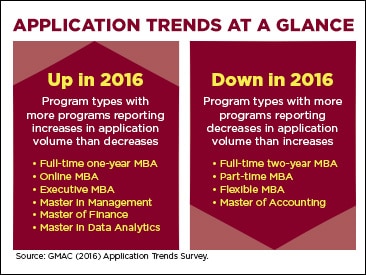The growing number of specialist Masters courses globally is beginning to impact demand for the traditional full-time, two-year Masters of Business Administration (MBA) programs, according to a new survey by the administrator of the GMAT test.
While nearly half (49 percent) of all graduate business programs received more applications in 2016 compared with 2015, new specialist programs, like the Master of Data Analytics, are attracting increasing interest from students.
The 2016 Application Trends Survey Report by the Graduate Management Admission Council (GMAC) has just been released.
The survey showed full-time one-year MBA, executive MBA, and online MBA programs experienced stronger application growth, whereas full-time two-year, part-time, and flexible MBA programs worldwide showed declining interest.
“Business degrees continue to be one of the most sought-after educational credentials,” said Sangeet Chowfla, president and CEO of GMAC.
“With the creation of more tailored business programs such as the Master in Data Analytics, the demand for entrance into business school is spreading across a growing supply of programs.
“With the competitive landscape changing, applicants have more options from which to choose, creating a mixed picture for business schools today.”
The annual survey is undertaken from June to mid-July 2016. The survey findings are based on responses from 335 business schools and faculties worldwide that received a total of 440,000 applications during the 2016 application cycle.
Sixty-five percent of European programs (across all program types combined) grew their application volumes. Forty-six percent of U.S. programs and 41 percent of programs in East and Southeast Asia grew their application volumes as well.
Additional program types experiencing application gains include the full-time one-year MBA, executive MBA, online MBA, Master of Finance and the Master in Data Analytics.
- A majority of all full-time one-year MBA programs (57 percent) report growing application volumes this year, building on the momentum of last year’s results when 51 percent reported growth.
- For the second consecutive year, a majority (57 percent) of online MBA programs report growing application volumes, up from 50 percent of programs that reported volume growth last year. Survey responses also show that 9 percent of online programs are new in 2017, signaling schools are implementing programs that are of high interest to prospective students.
- One of the newest programs in the graduate management education space — Master in Data Analytics — continues to see growing demand. Nearly all (94 percent) of the 16 data analytics programs that submitted data comparing 2015 with this year report application volume growth in 2016. The survey also shows program growth in this area as nine new programs will be seating their first classes this year.
A select number of program types realised fewer application submissions or held steady with last year.
- For the first time since 2012, fewer than half of full-time two-year MBA programs (43 percent) experienced year-on-year application growth this year. This is the second straight year that the share of programs reporting growth is down from a high of 61 percent in 2014.
- Part-time MBA and flexible MBA programs continue to exhibit the same application volume patterns seen over the past seven years since the end of the Great Recession. This year, just 43 percent of part-time MBA programs and 44 percent of flexible MBA programs report application volume growth.
- Master of Accounting programs continue a trend of declining growth. Less than half (44 percent) of programs experienced rising application volumes in 2016.












